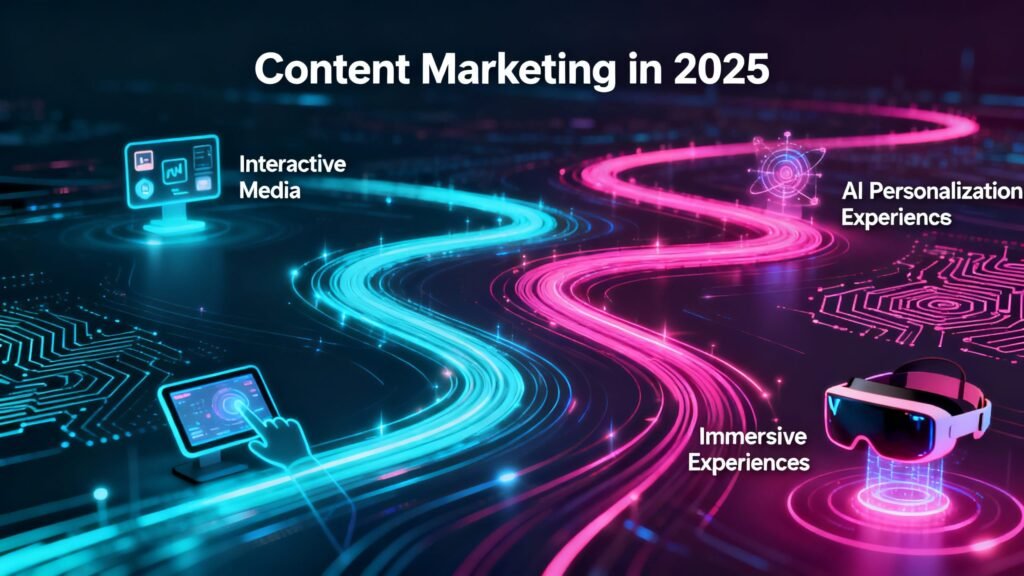
Introduction
Content marketing has always been about one thing: creating value for audiences to build trust, loyalty, and sales. But the way brands deliver that value keeps evolving. Ten years ago, a steady stream of blog posts was enough to keep customers engaged. Today, customers expect interactive videos, personalized recommendations, and meaningful conversations with brands across multiple platforms.
As we move into 2025, content marketing is no longer just a supporting strategy—it is the core of digital marketing. Brands that master it are not only attracting attention but also converting prospects into loyal advocates. Those that fail to adapt risk becoming irrelevant in a digital space where audiences are overwhelmed with choices.
In this article, we’ll explore the biggest content marketing trends shaping 2025, why they matter, and how businesses can apply them to drive both engagement and sales.
Why Content Marketing Still Matters
Content marketing continues to outperform traditional advertising because it focuses on building trust rather than pushing products. Customers don’t want to be sold to—they want to be educated, entertained, and inspired. By creating valuable content, brands achieve:
- Brand Awareness: Content puts businesses in front of audiences searching for answers.
- Engagement: Well-crafted articles, videos, and social posts keep audiences connected.
- Conversions: Content builds credibility, guiding prospects toward purchase decisions.
- Loyalty: Regular value builds long-term relationships with customers.
With AI, automation, and shifting consumer behavior, content marketing in 2025 is more dynamic than ever.
Key Trends Shaping Content Marketing in 2025
1. AI-Powered Content Creation and Personalization
Artificial Intelligence tools are no longer optional—they’re central to content strategies. AI platforms can generate blog outlines, recommend trending topics, create personalized email campaigns, and even write content drafts.
But the real power of AI lies in personalization. Businesses are now able to create tailored experiences at scale. A user reading about fitness products on a website may instantly receive personalized workout plans, product suggestions, and targeted email offers—all powered by AI-driven insights.
2. Interactive and Immersive Content
Audiences want experiences, not just information. In 2025, interactive quizzes, polls, 360-degree videos, augmented reality (AR) product demos, and virtual reality (VR) events are trending.
For example, a real estate company can create VR tours of properties, while an e-commerce brand can use AR to let customers “try on” clothing or makeup virtually. This type of content not only engages but also reduces hesitation in the buying process.
3. Short-Form Video Domination
TikTok, Instagram Reels, and YouTube Shorts have permanently changed how people consume content. Short-form videos—under 60 seconds—are now among the most effective ways to capture attention. In 2025, brands are increasingly prioritizing video-first strategies to reach younger, mobile-first audiences.
4. Voice Search Optimization
With smart assistants like Alexa, Siri, and Google Assistant becoming mainstream, voice search optimization is essential. Content must be adapted to conversational queries, often phrased as questions. Businesses that optimize FAQs, how-to guides, and local listings for voice search will capture this growing segment.
5. User-Generated Content (UGC)
Consumers trust peer recommendations more than brand messaging. In 2025, businesses are leveraging UGC—reviews, social media posts, and customer stories—as part of their content strategy. Encouraging customers to create content not only builds trust but also provides brands with authentic marketing material.
6. Sustainability and Purpose-Driven Content
Modern audiences want brands to stand for something beyond profit. Companies that create content around sustainability, ethical practices, and social impact resonate strongly with customers. This type of storytelling builds deeper emotional connections and customer loyalty.
7. Podcasting and Audio Content
Podcasts continue to grow as a way for brands to deliver long-form, valuable content. Audio content provides flexibility—customers can engage while driving, exercising, or multitasking. In 2025, more businesses are launching branded podcasts to establish thought leadership.
8. Data-Driven Storytelling
Analytics play a bigger role than ever in content marketing. Businesses are using data to identify what resonates with audiences, which formats convert best, and when and where to post. Data ensures content strategies aren’t based on guesswork but on measurable insights.
Benefits of Embracing 2025 Content Trends
- Higher Engagement Rates: Interactive and personalized content keeps audiences interested longer.
- Improved Conversion Rates: Short-form videos and UGC reduce hesitation and build trust.
- Wider Reach: Optimizing for voice and video ensures visibility across more platforms.
- Stronger Brand Loyalty: Purpose-driven content connects with customer values.
- Efficiency: AI-driven tools reduce the workload on content teams.
Challenges of Content Marketing in 2025
Content Overload
Audiences are bombarded with content daily. Standing out requires creativity and authenticity.
Technology Costs
Investing in AI, AR/VR, and high-quality video production can be expensive.
Consistency
Maintaining a steady flow of quality content is challenging without a clear strategy.
Data Privacy Concerns
Personalization relies on data, but businesses must remain compliant with regulations like GDPR and CCPA.
Practical Tips for Businesses
- Invest in AI Tools – Use them to streamline workflows, but always add human creativity for authenticity.
- Prioritize Video – Short-form and live-streaming should be a core part of content plans.
- Encourage User-Generated Content – Run campaigns that invite customers to share experiences.
- Adopt Omnichannel Distribution – Ensure content is consistent across websites, social media, and offline channels.
- Measure Everything – Use analytics to track what works and refine strategies.
Case Studies
Case Study 1: Nike
Nike leverages user-generated content through its fitness apps and campaigns like “You Can’t Stop Us.” This creates emotional resonance while keeping customers engaged with the brand.
Case Study 2: Sephora
Sephora uses AR to let customers virtually try on makeup. This immersive content not only improves engagement but also increases purchase confidence.
Case Study 3: HubSpot
HubSpot’s blog and podcast series provide educational, value-driven content that positions the brand as an authority. Their data-driven approach ensures content aligns with what audiences search for.
How Our Agency Helps
At our digital marketing agency, we specialize in creating forward-thinking content strategies that keep clients ahead of the curve. We help by:
- Developing AI-enhanced content plans.
- Producing short-form and interactive videos.
- Optimizing blogs and guides for voice search.
- Running UGC campaigns that build community trust.
- Tracking performance with advanced analytics.
We ensure that businesses don’t just follow trends but leverage them strategically to drive engagement and sales.
The Future of Content Marketing Beyond 2025
- Deeper AI Integration: Content will be generated and optimized almost entirely by AI, with human oversight.
- Immersive Commerce: Shopping will merge with AR/VR experiences.
- Greater Personalization: Hyper-personalized campaigns will become standard.
- Content for Micro-Moments: Brands will create content designed to meet needs in real-time situations.
Businesses that embrace innovation and remain agile will lead the future of content marketing.
Conclusion
Content marketing in 2025 is about more than blogs and social posts—it’s about creating immersive, personalized, and purpose-driven experiences. Brands that embrace AI, short-form video, interactive content, and data-driven storytelling will not only engage audiences but also convert them into loyal customers.
At our digital marketing agency, we help businesses craft content strategies that drive results. By combining creativity with cutting-edge technology, we ensure your content stands out in a crowded digital world.
The question is no longer whether content marketing works—it’s how effectively you can use it to capture attention and drive growth in 2025 and beyond.
